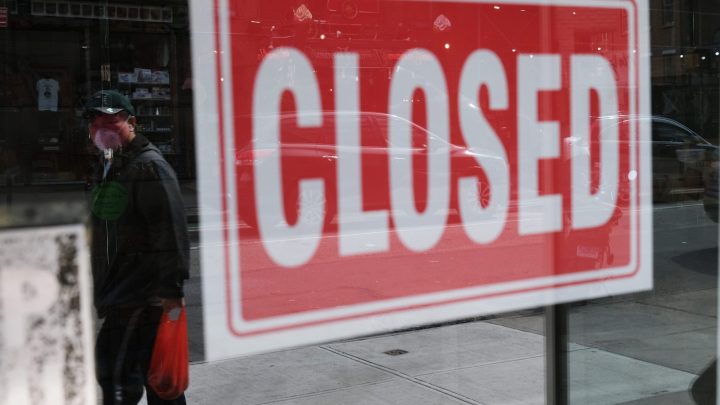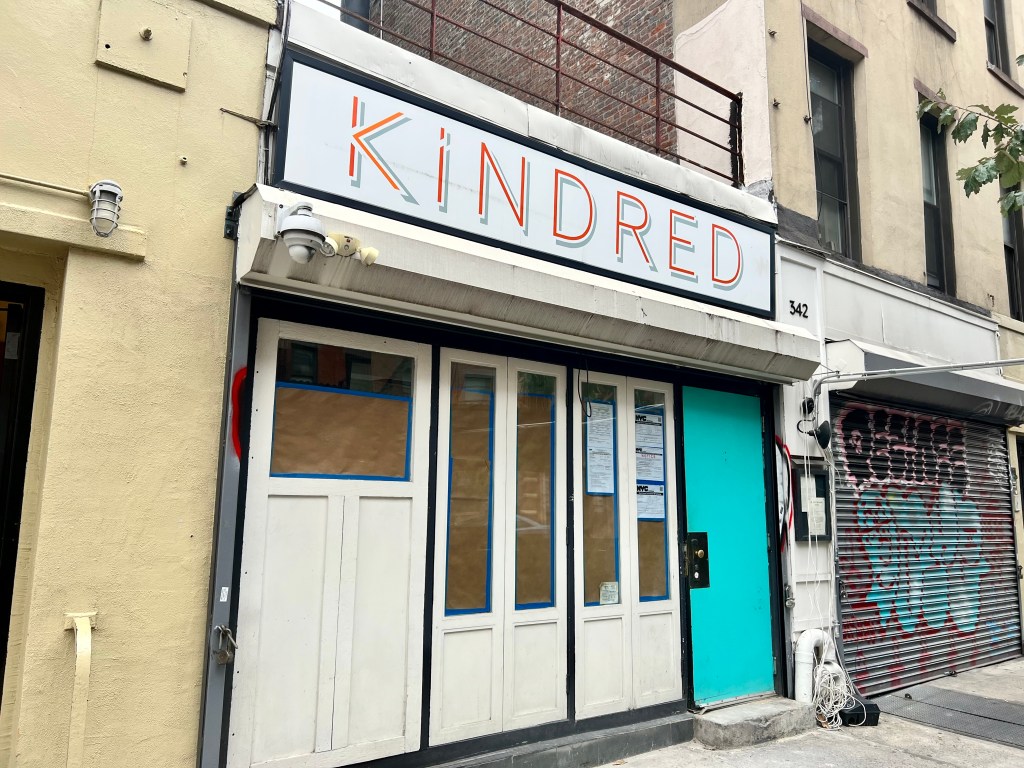
These businesses made it through the hardest part of the pandemic. Then they closed.
These businesses made it through the hardest part of the pandemic. Then they closed.

It’s been more than two years since Alexis Percival and her business partners closed Kindred, an Italian restaurant in New York City.
“And our sign is still up, which is a bummer. And the door that I personally painted is still the same color,” she said, staring at the bright teal door — a shock of color against the brown paper that covers the restaurant’s windows.
When the pandemic shuttered businesses in 2020, Kindred was still new and had just found its footing.
“We were just starting to be in the black, which is sort of unheard of for five months in at a restaurant,” Percival said.
COVID-19 turned that black back to red. And so, like every other business trying to avoid closure, Percival made pivot after pivot.
“I’m so sick of that word all these years later,” she said.

Kindred turned into a market, then a co-working space. And that helped the restaurant hang on until the COVID vaccines came out and customers felt safe.
“That was like a return to semi-normal,” Percival said. “People were so excited, so relieved. It felt like, OK, this is great.”
But the feeling didn’t last long. Business was up and down. Kindred was supposed to get an employee retention tax credit from the IRS worth $100,000, but that was delayed. Percival and her partners fell behind on rent. And looming in their minds were their investors, mostly friends and family.
“And that sense of responsibility weighs heavily,” Percival said. “You have a ton of people that invest a small amount of money. But it’s not a small amount of money to them.”
That’s partly why the decision to close the restaurant was difficult. In August 2022, Percival and her partners ran their last dinner service, though they still own a wine bar called Ruffian a few blocks away.
It’s unclear how many businesses have closed down in the past few years because data from the Bureau of Labor Statistics lags. But the pandemic is still having a domino effect on small businesses. A lot of them survived what was thought to have been the toughest days, during business restrictions and before the vaccines came out, only to fail on the other side.
Becky Cooper and her husband opened Bounce Milwaukee a decade ago, when she was having trouble finding activities for her family. Her husband thought: Why not open our own entertainment center?
“And I said, ‘I hate those places. I hate Chuck E. Cheese. I hate all these trampoline parks,'” Cooper said.
Her husband persisted though, and they dreamt up a business with rock climbing, laser tag and a bouncy castle.
“And we ended up getting our SBA [Small Business Administration] loan and a positive pregnancy test on the same day,” Cooper said.
That was kid No. 4. One decade and a pandemic later, business was better than ever. But recently, Cooper’s landlord increased the rent by 50% — way more than she could afford.
So, Bounce Milwaukee is now done. Cooper said that after all the ups and downs of business, she’s OK with that and is content with the work she’s done. She plans on looking for a job at a nonprofit. And in some ways, she’s sort of relieved to not be the boss anymore.
“It’ll be really nice having someone make all the decisions and tell me what to do,” she said.
It seems like every business that’s closed down has its own story — whether they couldn’t make rent or get enough customers back in the door. Jimmy Sweeney, who owned the Grand Berry Theater in Fort Worth, Texas, said knew he was in trouble in 2021 when he threw an Oscars party and three people showed up.
“And that was a moment of like, man, this is still going to be so much more of an uphill climb than we thought,” he said.
The Grand Berry Theater screened its last film in March 2022.
“I just remember after the doors closed and after our last employee left, I was just kinda sitting there and just broke down a little bit,” he said.
Since closing the theater, Sweeney and his wife sold their belongings and are traveling with their 3-year-old until they figure out their next steps. They’re in Italy right now. And in some ways, he said, this new lifestyle feels entrepreneurial.
“Traveling and living the way we do has a major essence of that,” Sweeney.
He said he loved running his business. But it was also stressful. And as hard as it was to close, he’s OK with moving on.
There’s a lot happening in the world. Through it all, Marketplace is here for you.
You rely on Marketplace to break down the world’s events and tell you how it affects you in a fact-based, approachable way. We rely on your financial support to keep making that possible.
Your donation today powers the independent journalism that you rely on. For just $5/month, you can help sustain Marketplace so we can keep reporting on the things that matter to you.


















